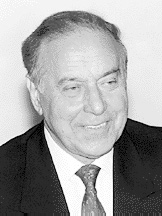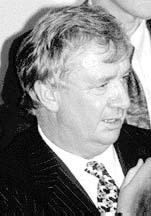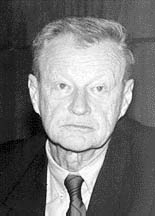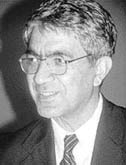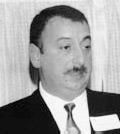|
Winter
1996 (4.4)  Multilingual Youth
Heydar Aliyev,
Azerbaijan's President, in a televised forum on "Youth" in Baku
(February 2, 1996).
Terry Adams,
President, AIOC (Azerbaijan
International Operating Company), in an interview with "Azerbaijan
International" in Baku (October 10, 1996).
Russia as Empire
Zbigniew Brzezinski, former National Security Advisor to President Jimmy Carter (1977-1981), in an interview with Open Media Research Institute, published in "Transition" (November 15, 1996).
"I regret that Armenia could not accept the principles which have the support of all other participating states." Flabio Cotti, Swiss Foreign Minister and Chairman of the OSCE (Organization on the Security and Cooperation of Europe) at the Lisbon Summit on December 3, 1996, when all 54 member countries except Armenia voted that Nagorno-Karabakh be legally defined as a part of Azerbaijan. [The three principles
of the Lisbon Declaration include (1) support for the territorial
integrity of Armenia and Azerbaijan; (2) the legal status of
Nagorno-Karabakh as one of the highest degrees of self-rule within
Azerbaijan; and (3) the guarantee for the security of Nagorno-Karabakh
and its entire Armenia Orchestrates Karabakh Conflict
Hafiz Pashayev,
Azerbaijan's
Ambassador to the United States, in Washington D.C., on learning
that Armenia had cast the single vote against the will of all
the OSCE nations at the Lisbon Summit which could bring about
a peaceful resolution to the war between Armenia and Azerbaijan
(December 5, 1996).
Ilham Aliyev, VP - Foreign Economic Relations of SOCAR (State Oil Company of Azerbaijan Republic) and son of the President of Azerbaijan, in an interview with "Azerbaijan International" in Baku (October 16, 1996).
"I know that the Azeri-Armenian conflict evokes deep passion in many of my colleagues, but the easing of the suffering of displaced civilians, children and refugees is not a political statement, it is a moral imperative. . .Does the United States want to act now to speed the process of recovery, rebuilding, and democratization? Or do we want to stand by and allow want and isolation to doom Azerbaijan and the Caucasus to a future of instability, authoritarianism, conflict and subjugation to reactionaries in Moscow?" William Cohen,
U.S.
Senator, urging Congress to lift the ban on humanitarian aid
to Azerbaijani refugees. "Congressional Record" (July
25, 1996). Nagorno-Karabakh: Not a Separate Entity "I understand that the House [of Representatives] included a provision which would imply separate legal status to Nagorno-Karabakh, a region of Azerbaijan. The international community, through the Organization for Security and Cooperation in Europe [OSCE] has already recognized the current borders of Azerbaijan as constituting its territorial integrity. Thus, a separate legal status for Nagorno-Karabakh is opposed by the international community and is against the policy of the United States." Robert Byrd, U.S. Senator and Ranking Democrat on the Senate Appropriations Committee, arguing against Nagorno-Karabakh being identified as a legal entity separate from Azerbaijan. "Congressional Record" (July 25, 1996). From Azerbaijan International (4.4) Winter 1996. Back
to Index AI 4.4 (Winter 1996) |

